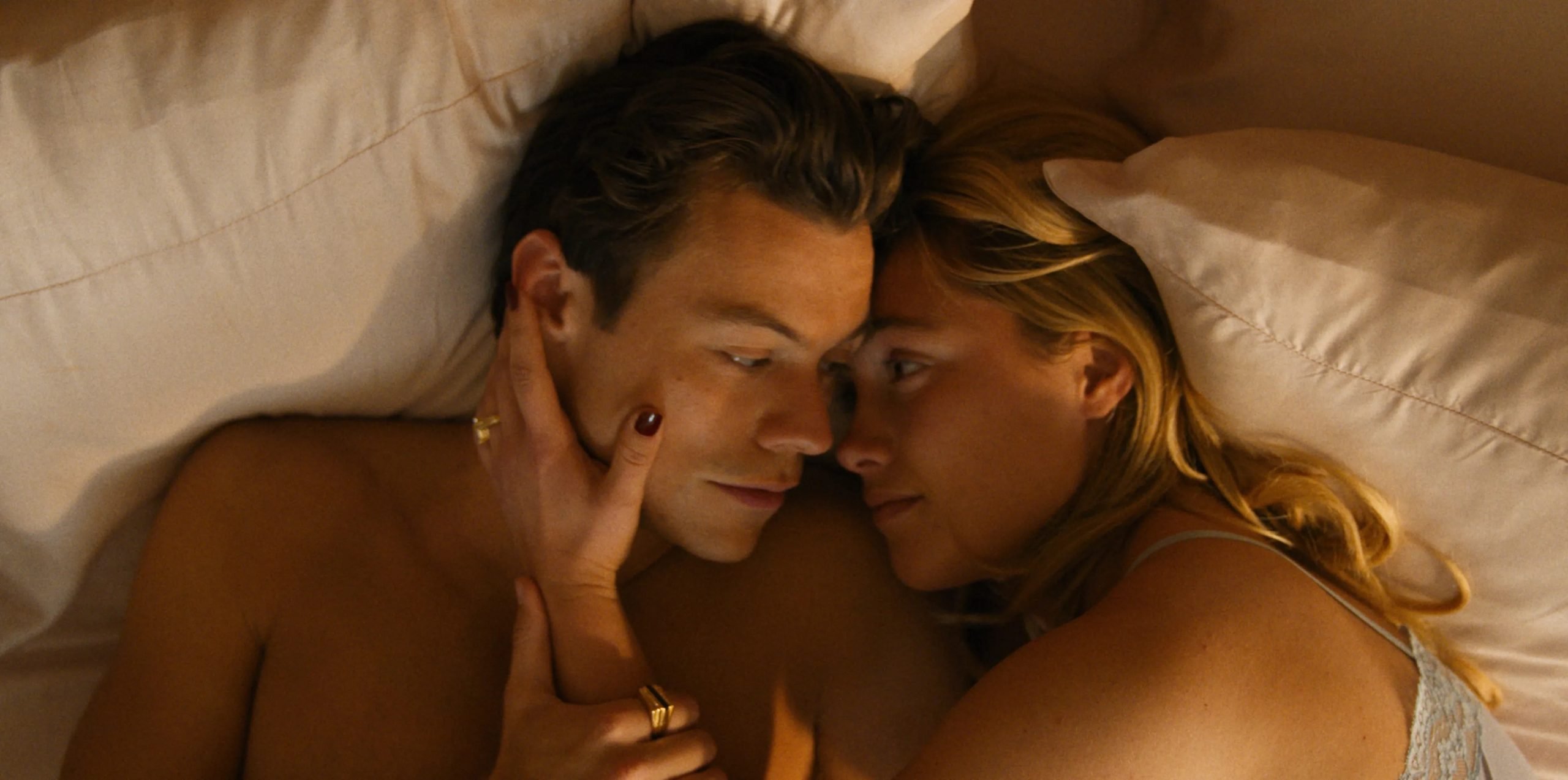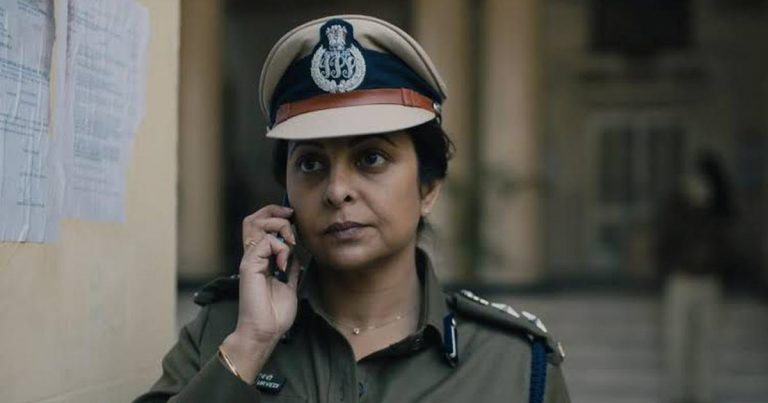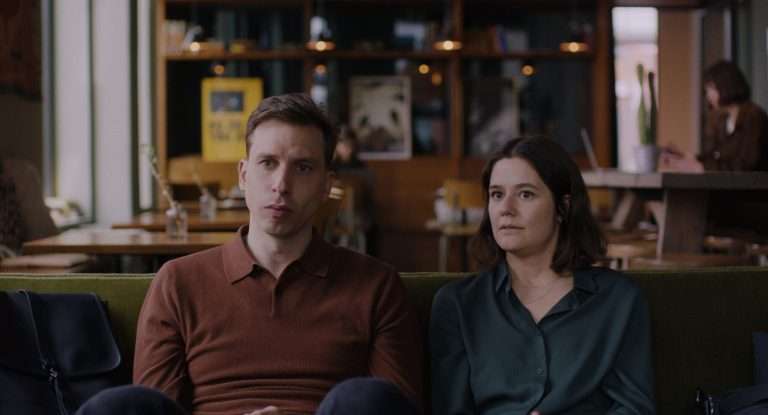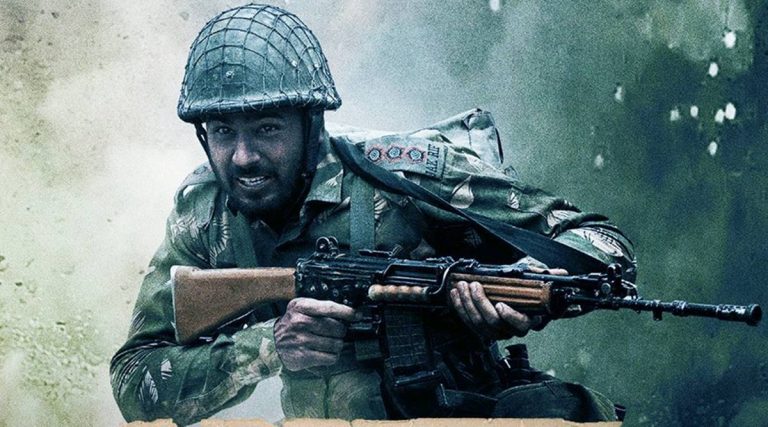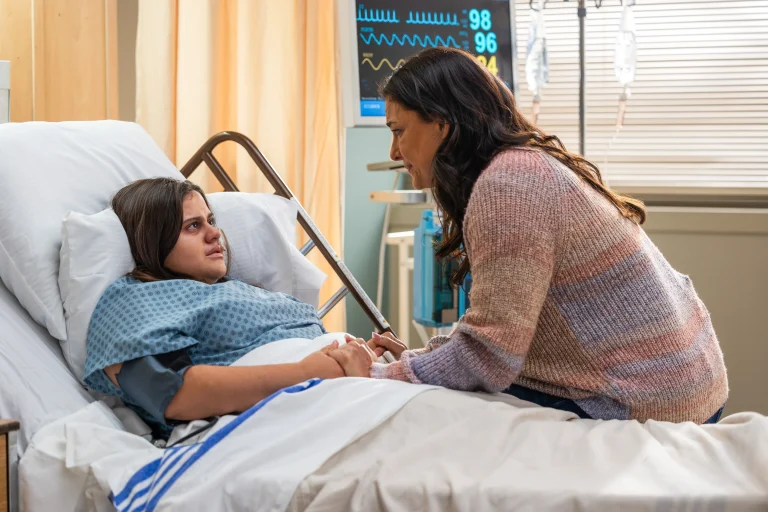In Olivia Wilde’s ‘Don’t Worry Darling,’ Alice (Florence Pugh) seems to be living in a wonderland. The sun-kissed Utopia is a place straight out of a dream. Surrounded by desert, the posh colony of aligned houses is a part of the Victory Project – a super secretive mission where the ‘men’ of the community go out each day in similar-looking cars for the “development of progressive materials.” The women of the house bid them goodbye, and fend to the needs of the house – cooking, cleaning, and being ready with a glass of scotch in their hands, and their bodies to be deflowered after a hard day at work.
The entire operation is run by Frank (Chris Pine) – a man who Alice’s husband Jack (Harry Styles) and the other men of Victory are so enamored by, that his personality almost feels like that of a cult leader. His supportive wife Shelley (Gemma Chan) is like a rock who further uplifts his idealogy of avoiding ‘chaos’ and accepting ‘control’ by making the housewives learn ballet – which is about rhythm and routine more than anything else. There’s only but one rule – none of the women should ever try to go past the development phase of the Victory Project. It’s a definite no-no if they ever try to so much as question what’s happening in the headquarters.
There’s also a bout of secrecy around what the men actually do through the day; the women are told not to question it because Frank and his subsidiaries are apparently changing the world. However, control can only go so far; the crack in the path to chaos starts to appear soon. Margaret (Kiki Layne), one of Alice’s close friends and one of the wives starts to act differently. In one of the many parties that Frank organizes, she vaguely stands out and questions what all of them are actually doing in Victory.
Her question falls on deaf ears as she is soon treated as ‘crazy’ by the townfolks. However, this little trigger also puts Alice in a perpetual state of delusion and paranoia, as she starts having visions of ‘feeling trapped’ in this supposed wonderland. What follows is a tantalizing and sinister downward spiral that takes Alice on a journey that’s more about her finding herself and her voice than uncovering the cruel intentions that lie beneath the perfect exterior of Victory Town.
Now, coming to the movie; I’d let the pre-release gossip off the bat. One of the major grips about all the drama off-screen was Harry Styles’ casting as Jack. Frankly speaking, Jack isn’t a particularly interesting character, to begin with. It also doesn’t help that the pop-star turned actor doesn’t have the acting chops in him to make it memorable either. As the dashing husband, he is fairly okay, but when the tables turn over in Victory Town, he doesn’t stand a chance against the tide of chaos that ensues. Also, trust me when I say this – all that talk about the ‘sex’ in Don’t Worry Darling being extremely orgasmic was a load of bull.
That said, Florence Pugh is the heart of Don’t Worry Darling. She oozes such whip-smart warmth as the delicate do-good wife that you believe that she will never realize her true potential or find her voice. However, Pugh makes sure she makes her lateral shift into a woman who speaks for herself, believable. There’s one particular sequence between her character and Frank that is worth sitting through a whole lot of mediocre, vintage-styled drama.
The supporting cast, on the other hand, could have roped in some intriguing character turns particularly by Olivia Wilde herself and Gemma Chan as Frank’s ‘ideal-wife’ stereotype. However, the screenplay doesn’t bother to ground them enough to make their turnaround in the final act feel real. Pine is in crackling form, but his vague, cult-like preaching sound all the more boring as the movie progresses, and I don’t think anyone on set realized that ‘his words’ could have had a grander impact on the film than it currently has.
Now, coming to the themes that Don’t Worry Darling is trying to explore, co-writer Katie Silberman is unable to really plunge into the feminist vs patriarchy angle that the script is going for. Sans a few explosive sequences, she plays this like a pretty straight-forward old-school, psychological thriller that is more interested in finding a way out of the mystery than establishing a more pertinent theme out of the premise it creates.
This misstep puts Don’t Worry Darling in a pretty sorry situation – the film both feels either too short or too long. Too short because, there’s not much time in its hand to explore its central idea of men trying to control the world for women, or women trying to find their footing in a world where the walls are constantly closing in on them. Too long because it can never achieve the b-movie pulpiness that is right there to exploit – if it had gone for a sort of mix between Pleasantville with the ways of The Stepford Wives, this would have been an extremely delicious dish to devour.
That said, Olivia Wilde’s direction feels pretty steady and confident to me. I wasn’t a big fan of Booksmart, in spite of the great critical reception, but she definitely has the chops needed to create an atmosphere of dread while everything around feels so flowery. If she wasn’t failed by the writing department, Don’t Worry Darling would have turned into something truly fascinating. While other technical departments like Matthew Libatique’s cinematography and John Powel’s incredible score really uplift the movie, I somehow feel that it’s a story that’s a few edits away from greatness.
